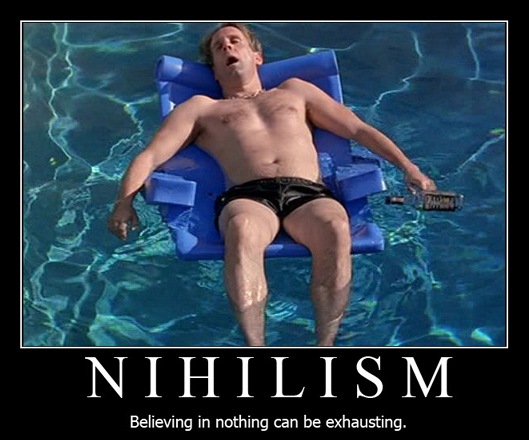I recall reading Crime and Punishment when i was 17, and originally forming a very biased view of it due to my young age. It seemed to me at the time to be about a revenge of the individual against society for its unfairness. I did not give much thought to the actual brutal violence shown by Raskolnikov, since i mostly thought it was a sort of need of the "special individual" to express himself.
However Raskolnikov had a different end, he wanted to stop feeling "like a fly", and also was quite distanced from the world and seemed to need a shock to return to it.
But this thread is not mostly about that novel, but the question whether nihilism has in your view as an inherent quality the possible violent expression of the individual.
In my opinion the critical parameter is that of one's character; if he is not violent in general then even if he becomes nihilistic chances are he will continue to not be violent. However it seems to me that nihilism can reach an apogee, where one does not care about anything, and therefore he can become under some circumstances like another of Dostoevsky's characters, Kyrilov. Kyrilov appeared at least on the surface to be completely empty of all hope or care, and he even agreed to commit murder, since he had the plan to kill himself anyway. Things did not turn out like that, but he still can be seen as a paradigm of a potentially dangerous nihilist.
What about you? Are you a nihilist? And even if you aren't what are your views of this psychical stance of indifference and annihilation of all meaning in the external (or possibly even the internal) world?
However Raskolnikov had a different end, he wanted to stop feeling "like a fly", and also was quite distanced from the world and seemed to need a shock to return to it.
But this thread is not mostly about that novel, but the question whether nihilism has in your view as an inherent quality the possible violent expression of the individual.
In my opinion the critical parameter is that of one's character; if he is not violent in general then even if he becomes nihilistic chances are he will continue to not be violent. However it seems to me that nihilism can reach an apogee, where one does not care about anything, and therefore he can become under some circumstances like another of Dostoevsky's characters, Kyrilov. Kyrilov appeared at least on the surface to be completely empty of all hope or care, and he even agreed to commit murder, since he had the plan to kill himself anyway. Things did not turn out like that, but he still can be seen as a paradigm of a potentially dangerous nihilist.
What about you? Are you a nihilist? And even if you aren't what are your views of this psychical stance of indifference and annihilation of all meaning in the external (or possibly even the internal) world?




